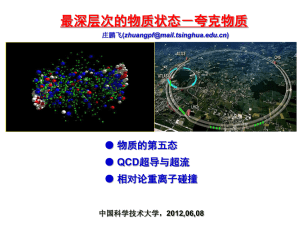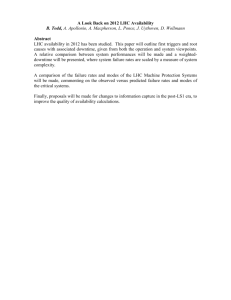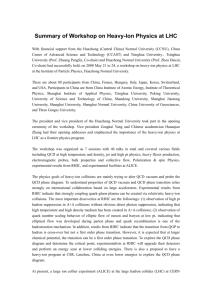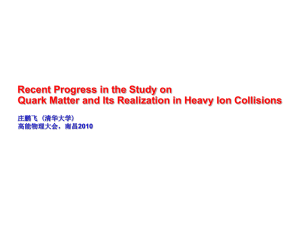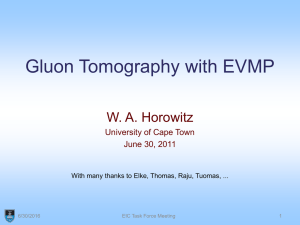Physics with muons in the ALICE experiment at the LHC
advertisement
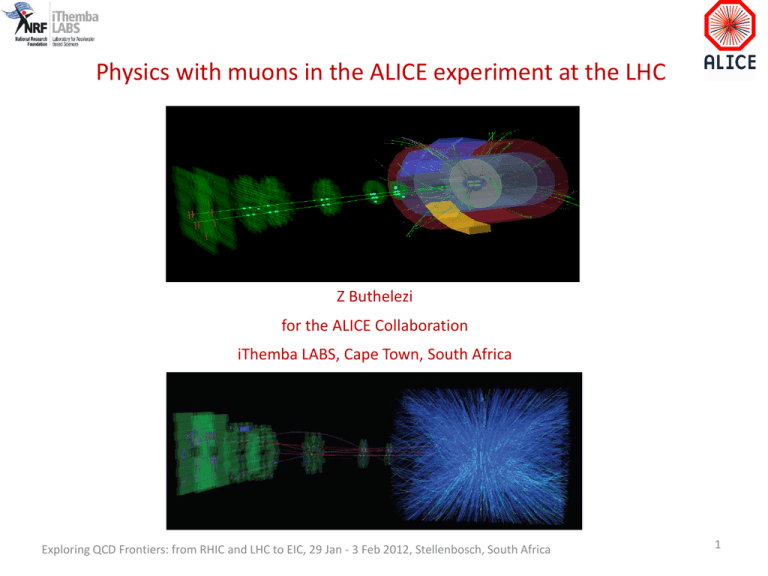
Physics with muons in the ALICE experiment at the LHC Z Buthelezi for the ALICE Collaboration iThemba LABS, Cape Town, South Africa Exploring QCD Frontiers: from RHIC and LHC to EIC, 29 Jan - 3 Feb 2012, Stellenbosch, South Africa 1 Outline •Introduction – Heavy Quarks in QGP medium • ALICE status and performance • Results in the forward rapidity region of ALICE •proton-proton collisions •PbPb collisions •Outlook on new study : W production in the forward rapidity region of ALICE Exploring QCD Frontiers: from RHIC and LHC to EIC, 29 Jan - 3 Feb 2012, Stellenbosch, South Africa 2 Heavy quarks in QGP medium Diagnostic tool for the formation of the QGP • Heavy quarks are produced at the beginning of the collisions (high Q2) • Pass through the medium and interact with it, losing energy by gluon radiation and elastic collisions - energy loss mechanisms – parton mass (Dead cone effect) – colour charge (Casimir factor) - ΔEg > ΔEu,d ,s > ΔE c > ΔE b Compare heavy / light flavour observables 1 d 2 N AA / dpt d RAA ( pt , ) 2 N coll d N pp / dpt d - Probe medium properties Medium density & size RAA() < RAAD < RAAB Yu. Dokshitzer and D.E. Kharzeev, Phys.Lett. B 519, 199‐206 (2001). Armesto, Salgado, Wiedemann, PRD 69 (2004) 114003. Djordjevic, Gyulassy, Horowitz, Wicks, NPA 783 (2007) 493. Exploring QCD Frontiers: from RHIC and LHC to EIC, 29 Jan - 3 Feb 2012, Stellenbosch, South Africa 3 Quarkonia, heavy ions and the QGP? History: – J/ψ suppression as a QGP signature (1986, Matsui and Satz- Phys. Lett. B178 (4): 416) machine sN (GeV) SPS RHIC 17 200 – NA38, NA50, NA60 @ SPS – PHENIX, STAR @ RHIC Left open questions: –J/ψ suppression “anomalously” similar @ RHIC & SPS – Sequential suppression (’, c) only – cold nuclear matter effect - still weakly constrained – statistical hadronization, recombination? that could be answered by the LHC enhanced J/ production yields @ LHC Thews et al. Phy. Rev. C 63(5):054905 (2001) Exploring QCD Frontiers: from RHIC and LHC to EIC, 29 Jan - 3 Feb 2012, Stellenbosch, South Africa 4 HF muon production @ the LHC? machine sNN (GeV) SPS 17 RHIC 200 LHC 2760 sLHC → best conditions to study QGP(S. Abreu, et al. arXiv:0711.0974) Access hard probe production cross sections Muon sources @ LHC - Light mesons decays: , K, - Charm decays: D, cc mesons (J/ +-) (~ 20 x RHIC) - Beauty decays: B, bb mesons (+-) (~100 x RHIC) - W / Z decays Muon pt distribution in HI is sensitive to b-quark energy loss effects RAA reduction due to nuclear shadowing of PDF W / Z yields expected to scale with <Ncoll> in parton-parton scattering calibration for HF RAA & test of the binary scaling assumptions Z.Conesa del Valle et al., arXiv:0712.0051v1 Exploring QCD Frontiers: from RHIC and LHC to EIC, 29 Jan - 3 Feb 2012, Stellenbosch, South Africa 5 The ALICE Detector Size: 16 x 26 meters Weight: 10,000 tons Detectors: 18 - HI collisions: measure all known observables to characterise the medium formed in the collisions - pp collisions: baseline for A-A and intrinsic interest, test pQCD models J. Instrum. 3, S08002 (2008) Exploring QCD Frontiers: from RHIC and LHC to EIC, 29 Jan - 3 Feb 2012, Stellenbosch, South Africa 6 ALICE Acceptance • Central barrel: -0.9 < < 0.9 2 tracking, PID (ITS, TPC, TRD, TOF) – single arm RICH (HMPID) – single arm em. calo (EMCAL ) Reduced – PHOS acceptance Quarkonia: e+e- channel Heavy flavour: hadronic channel, semi-leptonic decays (e+/-) • Forward muon arm: 2.5<y<4 Probe small Bjorken-x (10-5 – 10-3) Resolution (ΔP/P) goal: 1% @ 20 GeV/c, 4% @ 100 GeV/c absorber, 3 Tm dipole magnet 10 tracking + 4 trigger chambers Quarkonia: +- channel Heavy flavour: semi-leptonic decays (+/-) •Backward + Forward small acceptance detectors: multiplicity, centrality, luminosity & triggering (charged particles) µ arm J. Instrum. 3, S08002 (2008) Exploring QCD Frontiers: from RHIC and LHC to EIC, 29 Jan - 3 Feb 2012, Stellenbosch, South Africa 7 Results from proton-proton collisions @ 7 TeV in 2.5<y<4.0 Exploring QCD Frontiers: from RHIC and LHC to EIC, 29 Jan - 3 Feb 2012, Stellenbosch, South Africa 8 cross section vs pt and y Invariant mass distribution Inclusive J/ measurements Yield vs multiplicity •Highest charge multiplicity (dNch/d 30) reached. • linear increase of the yield vs multiplicity test interplay between hard & soft interactions in multi-partonic interactions and/or underlying event. Polarization vs pt Comparison with other LHC exp: •ALICE covers large rapidity range. •Good agreement with LHCb data. •Data well described by the NRQCD calculations Phys. Let. B 704 (2011) 442455 First J/Ψ polarization measurement @ LHC. - θ in HF - longitudinal polarization @ low pt which tends to vanish with increasing pt. CSF it is constant with polarisation -λφ is constant with 0. -Results can be used as stringent constraint to tune QCD models (NRQCD) for heavy quark production ArXiv:1111.1630, Phys. Rev Lett., in press Exploring QCD Frontiers: from RHIC and LHC to EIC, 29 Jan - 3 Feb 2012, Stellenbosch, South Africa 9 Low-mass dimuons arXiv:1112.2222v1 [nucl-ex] •Dimuon mass spectrum given as resonance (, ) decays into muons and semi-leptonic decays of charmed mesons •Tune models to data especially for hadrons containing u, d, s quarks •Give insight soft QCD processes (multi-parton interactions, pile up), which affects the high pt studies. Upsilon () production •Member of B-quark family •Preliminary plot of the invariant mass distribution Analysis is ongoing… Exploring QCD Frontiers: from RHIC and LHC to EIC, 29 Jan - 3 Feb 2012, Stellenbosch, South Africa 10 Production of HF single muons • • • Background (,K) subtracted using MC after normalization to data @ low pt. Differential cross-sections are well described according to FONLL( pQCD). Muon from beauty decay dominate for pt >~6 GeV/c. arXiv:1201.3791, accepted by Phys. Lett. B Exploring QCD Frontiers: from RHIC and LHC to EIC, 29 Jan - 3 Feb 2012, Stellenbosch, South Africa 11 Results from Pb-Pb collisions @ 2.76 TeV in 2.5<y<4.0 Exploring QCD Frontiers: from RHIC and LHC to EIC, 29 Jan - 3 Feb 2012, Stellenbosch, South Africa 12 Inclusive J/ RAA 1 d 2 N PbPb / dpt d RAA ( pt , ) 2 N coll d N pp / dpt d -Little to no dependence on centrality. -Less suppression observed at LHC than @ RHIC in the forward rapidity region. more shadowing @ LHC but nuclear absorption is less to none. Exploring QCD Frontiers: from RHIC and LHC to EIC, 29 Jan - 3 Feb 2012, Stellenbosch, South Africa 13 Exclusive J/ production - ultra peripheral collisions - Two ions (or protons) pass each other with impact parameters, b > 2R -Electromagnetic interactions are possible -Number of photons scale as Z2 for single source ⇒ exclusive particle production in HI dominated by electromagnetic interaction - In Pb+Pb collisions at 5.5 TeV: (hadronic) ~ 8b R. Bruce et al., Phys.Rev. 12 071002 (2009) (e+e-) ~ 281 b (EMD) ~ 226 b - Allow access to information on the gluon density - Nuclear gluon shadowing - Coherent (J/ + A production in UPC) - MUON in coincidence with V0C, but V0A vetoed. - Veto activity on V0C outside muon acceptance. - 2 good tracks in the muon acceptance, both tracks match the trigger. - At least one track has a pt > 1 GeV/c. Exploring QCD Frontiers: from RHIC and LHC to EIC, 29 Jan - 3 Feb 2012, Stellenbosch, South Africa 14 J/ elliptic flow azimuthal distribution of particles in the plane to the beam axis, z d 3N 1 d 2N E 3 1 2 n cos n R d p 2 pt dpt d y n 1 Y. Liu, N. Xu, P. Zhuang, Nucl.Phys.A834 (2010) 317c E - energy of particle, P - momentum, pt - transverse momentum, y – rapidity, - azimuthal angle, R - reaction plane angle n- Fourier coefficient, lowest order terms: 1- direct flow 2- elliptic flow •Regeneration / combination of c quarks for J/ production will dominate the J/ flow @ LHC compared to those at low energies •Various methods are being investigated for v2J/ elliptic flow. •Analysis is in progress . High statistics sample from 2011 PbPb runs will allow to measure J/ flow from pt = 0 GeV/c. Exploring QCD Frontiers: from RHIC and LHC to EIC, 29 Jan - 3 Feb 2012, Stellenbosch, South Africa 15 Production of HF single muons RCP ( pt ) 1 / T 1 / T AA AA dN / dpt dN / dpt central peripheral TAA – nuclear overlap function Grey – normalization error: ratio <TAA>peripheral /<TAA>central Red box: systematic errors dN/dpt Bars: statistical errors -Background from , K decays were not subtracted. -Muons from HF decays dominate for pt > 4 GeV/c. -Suppression of a factor ~2.5 in the most central collision. Exploring QCD Frontiers: from RHIC and LHC to EIC, 29 Jan - 3 Feb 2012, Stellenbosch, South Africa 16 Outlook on new study: W± production via single muon channel in the forward rapidity region of ALICE: 2.5 < y < 4.0 Exploring QCD Frontiers: from RHIC and LHC to EIC, 29 Jan - 3 Feb 2012, Stellenbosch, South Africa 17 Motivation Initial study “W production in pp, PbPb & pPb collisions @ LHC energies: W± detection in the ALICE Muon Spectrometer” Z.Conesa del Valle et al., Eur. Phys. J. C61 (2009) 729-733 Scientific motivation: - W muons have a high pt ~ MW /2 W± as reference for observing QGP induced effects on QCD probes, e.g. suppression of high pt heavy quarks - Probe PDF in the Bjorken-x: x (10-4–10-3) 2.5 < y < 4.0 @ Q2 ~ M2W± MW = 80.398 ± 0.25 GeV/c2, electric charge: ±1 e, spin = 1 weak interactions change generation of a particle (quark flavour change) - study nuclear modification of quark distribution, validate binary scaling Measurements in the forward rapidity region of ALICE: 2.5 < y < 4.0 , pt>1 GeV/c, P > 4 GeV/c will be complimentary to those done by ATLAS & CMS @ central rapidity || 2.5, with large pt > 3-4 GeV/c Exploring QCD Frontiers: from RHIC and LHC to EIC, 29 Jan - 3 Feb 2012, Stellenbosch, South Africa 18 Predictions with PYTHIA Process: 2 1, initial and final state radiation ff W Decay channels : W → + (10.57 ± 0.15%), W cX ... Y (33.6 ± 2.6 %) PbPb collisions @ s = 5.5 TeV: pp, nn & np combinations. PDF EKS98 shadowing parameterization K.J Eskola et al Euro. Phys. J. C, 9:61, 1999 Lowest & 2nd order diagrams for W production in hadron-hadron collisions Differential cross section - Frixione and Mangano, Hep-ph/0405130 th W exp 1 1 N Obs W BR W Ldt AW <L>PbPb~5·1032 cm-2s-1 for t = 107 s (~ 0.5 nb-1) G. Martinez, hepex/0505021v1 (2005), F. Carminati et al. J. Phys G30, 1517, 2004 (W)PYTHIA x BRW→ = 17.3 nb , spectra normalised to NLO calculations: th(W)NLO x BRW→ = 20.9 nb Lai et al, arXiv:hepph/9060399v2,10 Aug 996 W muons have a high pt MW /2 30 – 50 GeV/c. It is estimated that @ pt =(30, 50) GeV/c the reconstructed yield, NW = 6.9x103 the forward rapidity range: 2.5 < y < 4.0 . Z Conesa del Valle et al., arXiv:0712.0051v1 Exploring QCD Frontiers: from RHIC and LHC to EIC, 29 Jan - 3 Feb 2012, Stellenbosch, South Africa 19 Recent PbPb runs @ the LHC http://lpcc.web.cern.ch/LPCC/index.php?page=luminosity_charts Increase in luminosity statistics increase by ~ 18 times more than in 2010. High pt reach for HF muon production, e.g. W and Z decay muons ? Exploring QCD Frontiers: from RHIC and LHC to EIC, 29 Jan - 3 Feb 2012, Stellenbosch, South Africa 20 Strategy for W±± production in PbPb collisions with ALICE – Measure differential cross sections as function of pt and y in forward region: 2 < < 9 2.5 < y < 4, pt >1 GeV/c, P > 4 GeV/c – – – Z Conesa del Valle et al., arXiv:0712.0051v1 Subtract background in the pt region below pt MW / 2 30–50 GeV/c. Use high level trigger to reject background. J. Phys: Conf. Series 219 (2010) 02244 Compare single muons ratios: + / - charge asymmetry. – Extract RAA, RCP. – Compare with theoretical predictions. Exploring QCD Frontiers: from RHIC and LHC to EIC, 29 Jan - 3 Feb 2012, Stellenbosch, South Africa 21 Summary •ALICE has measured inclusive J/, low mass dimuons and HF single muon cross sections in pp collisions at 7 TeV. Good progress also on analysis at 2.76 TeV. •Upsilon analysis at 7 TeV is in progress. •Data show a suppression of HF decays in PbPb collisions is seen in RCP. •It is observed that suppression increases with increasing centrality. •For the J/ case, the observed suppression is almost constant wrt centrality. •Exclusive J/ measurements in ultra-peripheral PbPb collisions in the forward rapidity region of ALICE are also underway. •Statistics from the 2011 PbPb runs should allow to study W production in the forward rapidity region of ALICE. Exploring QCD Frontiers: from RHIC and LHC to EIC, 29 Jan - 3 Feb 2012, Stellenbosch, South Africa 22 Back up slides Exploring QCD Frontiers: from RHIC and LHC to EIC, 29 Jan - 3 Feb 2012, Stellenbosch, South Africa 23 Cross Section evaluation The same procedure adopted for the 7TeV paper has been followed Where: NMB ~ 22.5 106 NMB ~ 1.4 104 N-MB ~ 4.2 105 number of CINT1B triggers. After physics selection, a small decrease is expected (was ~1-2% in LHC10e) Number of single with pT>1GeV/c, surviving standard cuts, in CINT1B (NMB) or CMUS1B (N-MB ) trigger Exploring QCD Frontiers: from RHIC and LHC to EIC, 29 Jan - 3 Feb 2012, Stellenbosch, South Africa 24 Centrality measurements in PbPb collisions @ 2.76 TeV Events: - MB trigger events Centrality class: 0-80% determined by V0 Glauber model analysis of large-η V0 scintillator amplitudes :V0A : 2.8 < η < 5.1, V0C : -3.7 < η < -1.7 Phys. Rev. Lett. 106, 032301 (2011) Exploring QCD Frontiers: from RHIC and LHC to EIC, 29 Jan - 3 Feb 2012, Stellenbosch, South Africa 25 HF muon cross sections in different pt bins, pp collisions @ 7TeV arXiv:1201.3791, accepted by Phys. Lett. B Exploring QCD Frontiers: from RHIC and LHC to EIC, 29 Jan - 3 Feb 2012, Stellenbosch, South Africa 26 Comparison of theoretical prediction for W production at the LHC (Anastasiou et al, hepph/0312266v2) PbPb collisions @ 2.76 TeV: J/Psi RCP measurements in 2.5<y<4.0 RCP ( pt ) 1 / T 1 / T AA AA dN / dpt dN / dpt central peripheral ALICE data exhibits less suppression @ forward rapidity and low pt compared to ATLAS TAA – nuclear normalisation factor Exploring QCD Frontiers: from RHIC and LHC to EIC, 29 Jan - 3 Feb 2012, Stellenbosch, South Africa 28
